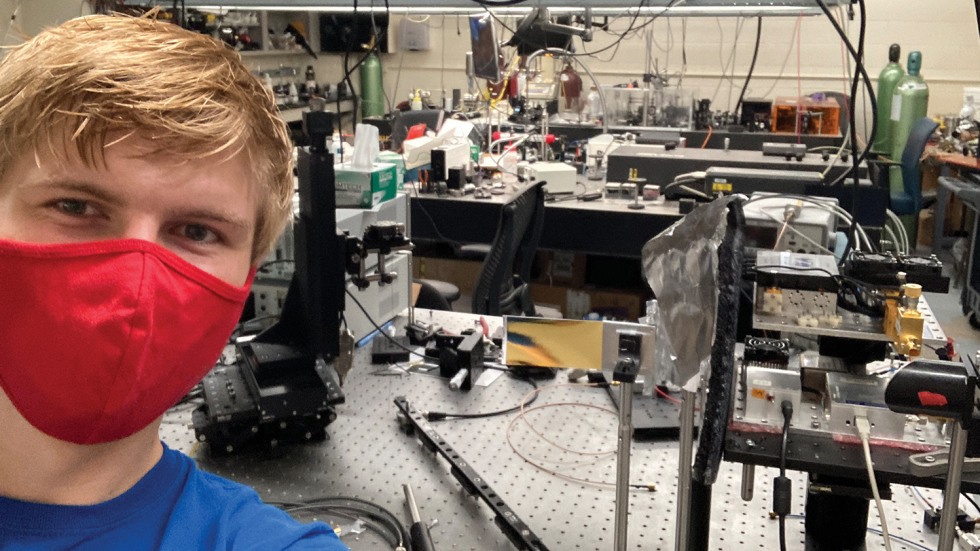The Carl Nielsen ’56 Summer Research Fellowship enabled Malachi Hornbuckle ’22, an electrical engineering concentrator from Nevada, Iowa, to investigate the trade-off between security and data rates in the terahertz frequency range of the electromagnetic spectrum (higher than 100 GHz). This frequency realm fuels much of the work in Professor Dan Mittleman’s lab.
“I was looking at the security viewpoint having to do with the fact that terahertz signals are more directional, and also that when you get into the terahertz frequency range, you reach some frequencies where water vapor in the atmosphere interacts really strongly with the signals you are sending,” Hornbuckle said.
“At certain signals you have really strong attenuation and really strong phase effects like group velocity dispersion,” he explained. “If you send a pulse, it will slowly bleed out and become unreadable. And if you’re sending a bunch of pulses in a line they will bleed into each other. We were focused on trying to simulate that and figure out at which specific frequencies you can send data, and how far you can send it before you can’t read it anymore.”
Securing these transmissions would prove especially beneficial to military or other governmental users, Hornbuckle said. “They may be interested in sending a signal where they know they are going to have their receiver a certain distance away, and they know the humidity, atmospheric pressure and weather are certain specific conditions, so that the signal will be interpreted by their intended receiver and nothing beyond that.”
When campus laboratories were shut down in March, and even upon summer restart, there was not a clear path for undergraduates to return to the physical lab. In addition, the humidity chamber ordered for the project was delayed because of the pandemic. Hornbuckle worked with Professor Mittleman and the lab group to enable this research to be done remotely.
“I was working with (Ph.D. candidate) Zhaoji Fang and the plan was that he would be in charge of the computational simulation stuff, and I would be more in charge of running the actual experiments in the lab. But that got flip-flopped a little bit when I couldn’t be on campus and we didn’t have the equipment. We ended up working in tandem on the simulation. He would do a lot of reading the research papers and figuring out what we needed to do and I would go into MATLAB and try to figure out a way to do it. Probably not always the most efficient way to do it,” he chuckles, “but a way to do it.”
“I went into engineering because I like math and science. But not math to the point where I wanted to just do math, or science to the point where I just wanted to do all science. I like using them to do other things. I wasn’t really sure what kind of engineering I was interested in until I took E&M (ENGN 0510, Electricity and Magnetism) during my sophomore fall. I liked thinking about how it all worked,” he said.
“When I was on the Brown engineering research faculty website looking at what people were doing, trying to find a research opportunity for the summer, I recognized Professor Mittleman as our E&M professor and I figured whatever he’s doing, it has to be related to this class I was really enjoying. So I talked to him after class one day and he showed me the lab.”
Hornbuckle then took an optics class in the spring for background as the two discussed his summer plans. He found it a fit for his interests as well, and is currently looking into optical engineering internships for summer 2021. He also plans to head back into the Mittleman lab this spring, taking advantage of a lighter course load and hoping to utilize the humidity chamber once it arrives.
“My two big other involvements on campus are band and the running club,” he said. “The running club is a byproduct of the fact that I think it’s important to work out. It gives you a break and helps keep your body working well.
“And the band is my big break time from school,” he said. “I’m the conductor for the band right now, which has been interesting with remote rehearsals, and not being physically in one place. The band is great because it’s a group of people that are all just there to have fun. Normally, we’d get to go to sports events and cheer for Brown,” he said, “and travel to other schools and meet their bands.”
Although the travel piece waits indefinitely, Hornbuckle is hopeful an internship next summer will help determine if his future is in industry or academia, and credits the Nielsen Fellowship with providing the academic research experience to help him decide.
